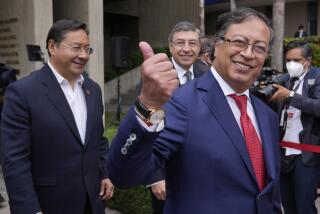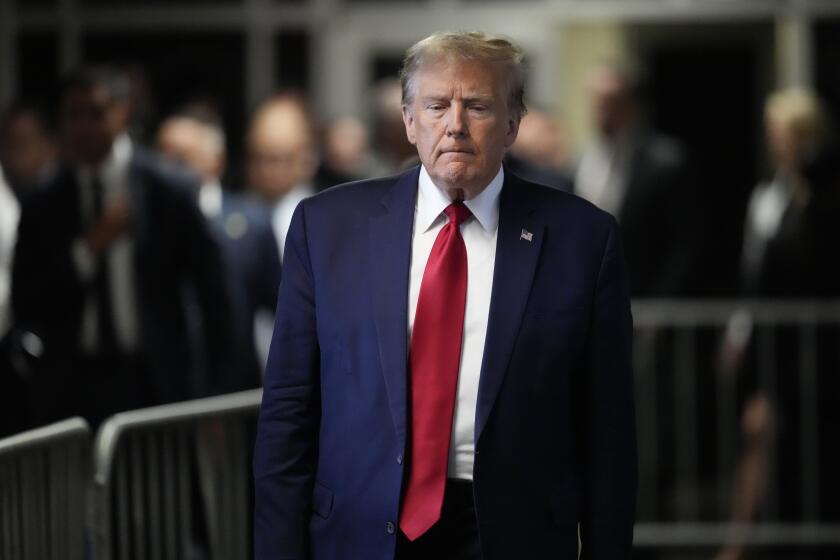Back in Libya after decades in exile, a dissident takes on Kadafi
Reporting from Tripoli, Libya — He remembers the desperate pleas of the men at the gallows as they were about to be hanged. Their faces were hidden by black hoods.
A man at the podium declared the two had acted against Col. Moammar Kadafi, who had just taken over as leader of Libya. “‘We didn’t do anything, we didn’t do anything,’” he remembers the two men pleading. “‘Oh, God. We are not guilty.’ And then they started reciting the Koran.”
That was four decades years ago, and Anwar Magariaf, who would grow up to become a devoted militant against Kadafi, was perhaps 11 years old. He began to cry.
“Kadafi started killing us from the day he came to power,” the dissident said. “This is why we hate him. There is no court. A man makes a decision and two people die.”
Magariaf, a leading member of the exiled National Front for the Salvation of Libya, represents some of the paradoxes of the ongoing rebellion against Kadafi. Though a bitter critic of the longtime dictator, he has been a guest of the Libyan government for more than two months. And some experts say such opposition groups, as much as they would like to see Kadafi removed, have been gone too long to be much help.
For some Libyans, Kadafi was the brash army commander who helped overcome the humiliation of Italian occupation and the legacy of an ineffective monarchy. He was a populist who seized the properties of foreigners and the rich and redistributed them to the poor, who kept gasoline and bread cheap.
Perhaps, such people might agree, he allowed himself to be surrounded in recent years by corrupt and incompetent deputies.
But for others like Magariaf, who late last year returned to his homeland for the first time in more than 30 years, Kadafi was a ruthless tyrant from Day 1, a cunning autocrat who manipulated Libya’s tribal system and strategically doled out the country’s oil wealth.
“Ninety-nine percent of the people hate him, even those who say they like him,” he said. “Money talks. He uses money in the right way.”
Magariaf displays the passion and insight of those, mostly living abroad, who have been dedicated for years to removing Kadafi. But his example also underscores the weaknesses of a relatively unknown opposition that is perhaps too rooted in exile groups, tribally oriented and politically inexperienced to connect with the Libyan people.
Magariaf said that, unlike the homegrown and largely peaceful revolutions that overthrew autocrats in Egypt and Tunisia, it probably will take guerrilla war and Western intervention to unseat Kadafi.
“The regime so destroyed the Libyan civil society that the opposition is incapable of providing an alternative,” said Moncef Ouannes, a professor of political sociology and a Libya specialist at the University of Tunis in neighboring Tunisia. “As for the opposition abroad, they are unconnected to the reality of the country and lack credibility with the population.”
Kadafi in recent years has sought to manipulate exiled opposition groups, offering a piece of the political pie in exchange for recognizing his family’s reign. His government has even integrated some Islamic radicals who fought against it into the political patronage system.
Magariaf is a member of the Maghrebeh tribe, among the largest in the rebel-controlled east. He returned on invitation by authorities who urged him to become a Kadafi supporter, arguing that only a few people around the leader were responsible for the government’s mistakes.
It was a tough sell to Magariaf, who had joined the anti-Kadafi movement as a teenager in his native Benghazi. He became member of a guerrilla group on the run in Iraq, Morocco, Egypt, Chad and Algeria. “I went everywhere I could to fight Kadafi,” he said.
Magariaf’s beloved brother Izzat disappeared in Cairo while recruiting and dispatching fighters to Libya in 1990. He suspected Egyptian and Libyan security officials kidnapped him and took him back to Libya, and worried he was next. He and his wife moved to London, where he gained British citizenship. They raised two daughters and started a business.
But his brother’s disappearance gnawed at him. And when a Libyan official said he could return to his homeland and attempt to find his brother, he jumped at the chance. He even brought his two daughters, Aisha, 24, and Nourine, 14, who videotaped Dad’s Dec. 23 homecoming.
It was a bittersweet trip. He took his daughters to Benghazi and to Tripoli, the capital, where he reunited with relatives he hadn’t seen since childhood. But as he tried to find out about his brother, he became convinced that he was dead and that the government was afraid to tell him.
“I don’t believe he’s alive anymore,” he said, choking up with tears. “He’s gone. They killed him.”
The revelation liberated him from his fears.
When the uprising against Kadafi broke out on Feb. 17, Magariaf became more outspoken.
“You are liars!” he yelled one morning to a group of Kadafi supporters at the hotel where is staying. “You don’t like Kadafi! Why don’t you say it? Be a man.”
Authorities have put a security detail on him and upped the pressure since the unrest started, but have not arrested him. They told him to go on official Jamahiriya television Tuesday to lend his support to Kadafi. Instead, he told his life story, using the airtime as an opportunity to publicize the National Front. He became an instant celebrity.
“They told me what to say, but I didn’t follow,” he said. “I changed the script. [The authorities] are stupid, and they took it the other way.”
When security forces and apparent foreign mercenaries opened fire on demonstrators on Feb. 25, he waded into the streets. “I started shouting, ‘Killers! You’re killing our people!’” he recalled.
But despite his passionate support for the protesters, he admits that his group doesn’t have much to do with those taking to the streets. “I don’t know who they are,” he said. “They are 35 or 40 [years old]. Men. I guess they use Facebook to organize.”
Kadafi’s strength, he said, lies in the manipulation of the poor and his support from two tribes, his own Kadafa and the Warfallah. He dismisses the mobs of people shouting support for Kadafi and waving green banners as mostly ignorant youths. “No one even knows what he’s shouting about,” he said. “They get nothing but a little bit of money.”
Magariaf said his group, originally led by his brother Mohammad, would accept whatever military help it could get, including from the United States, which he said supported it for many years. He predicted that it would take guerrilla war with international support to dislodge Kadafi, especially from his strongholds in Tripoli and Surt.
“They’re listening, they’re waiting. Anyone who wants to do something, can’t,” he said of groups like his. “We wish we could do it on our own, but can’t.”
More to Read
Sign up for Essential California
The most important California stories and recommendations in your inbox every morning.
You may occasionally receive promotional content from the Los Angeles Times.










